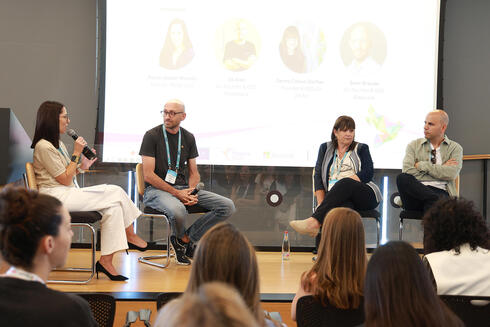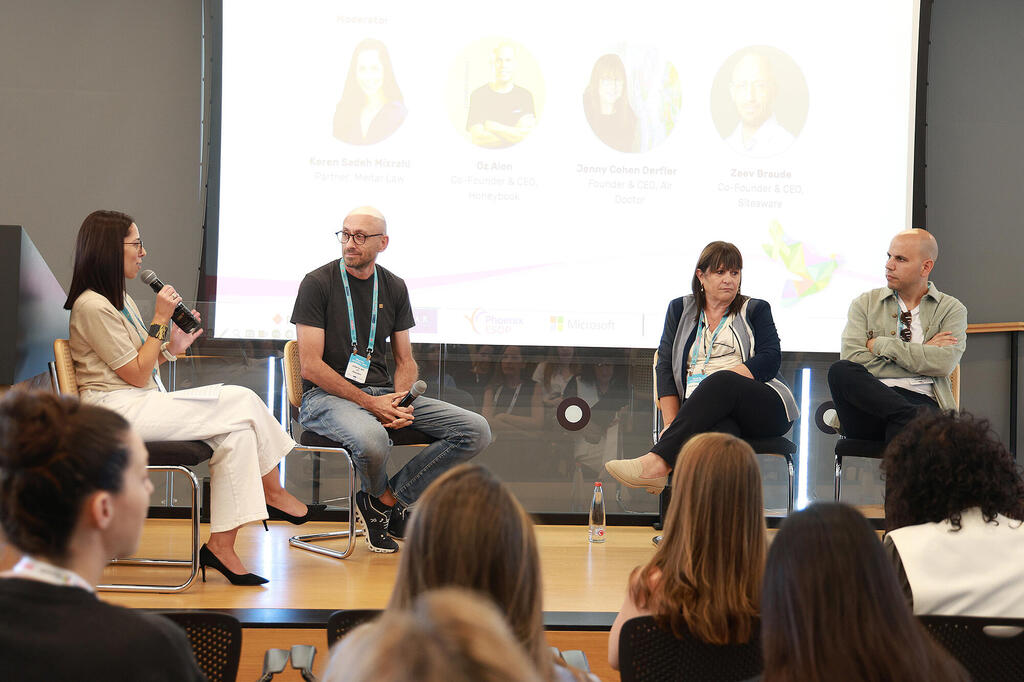
"Diversity should be visible throughout the company’s structure - not just at the board level"
Oz Alon, CEO of HoneyBook, Jenny Cohen Derfler, CEO of Air Doctor, and Zeev Braude, CEO of SiteAware, spoke on a panel during the Power in Diversity conference about how to build diverse companies from the ground up
"Diversity at the startup's founding stage greatly helps to maintain diversity throughout the company’s journey," said Oz Alon, Co-Founder and CEO of the unicorn HoneyBook, during a panel held last week at Microsoft offices in Tel Aviv as part of the Power in Diversity conference.
The panel, moderated by Keren Sadeh Mizrahi, a partner at Meitar Law Offices, discussed how to build diverse companies from the outset and also included Jenny Cohen Derfler, Founder and CEO of Air Doctor, and Zeev Braude, Co-Founder and CEO of SiteAware.
1 View gallery


The panel: Keren Sadeh Mizrahi, Zeev Braude, Jenny Cohen Derfler, and and Oz Alon.
(Credit: Avigail Uzi)
Oz, HoneyBook was founded by four co-founders - two women and two men- and diversity was a consideration of yours from the very beginning. What impact did this have on you as a company?
Alon: "From the start, the founding team was diverse, and we saw that it had a significant influence on every subsequent stage of recruitment. Our first hire was a woman and, as a result, when we were hiring later on, it greatly helped when female candidates saw that there were already women at the company. In short, diversity at the initial stage really helps to maintain diversity going forward."
Jenny, how have you handled the issue of wage gaps between men and women?
Cohen Derfler: "Before Air Doctor, I dealt with this issue in my role at Intel. We looked for a structured way to solve the problem - not through persuasion but through concrete steps. If there was a certain annual budget for salary raises and 25% of the employees were women, then a quarter of the budget allocated for raises had to go to women. If this wasn’t met, we would send the salary decisions back to the departments. This forced managers to ensure that everyone advanced equitably."
Zeev, the majority of your employees are women, including in senior management. On the other hand, your industry, construction, is not typically seen as female and is quite traditional. Was building a female team a consideration?
Braude: ”What was challenging for us was when we hired construction workers for our company, who struggled to accept that there were female managers making decisions. When we hired female construction workers from the U.S., they were accustomed to a high glass ceiling, and joining us initially confused them. With some coaching, we explained that they could achieve what they wanted. I believe bringing women into traditional industries is a no-brainer and shouldn’t be feared."
Oz, what value does a diverse board of directors bring?
Alon: "Diversity should be visible throughout the company’s structure - not just at the board level. At HoneyBook, women make up 50% of our workforce and 60% of management. Additionally, most of our clients are women. We serve small businesses in the U.S., many of which are run by women, so it’s important that our company reflects that diversity."
Jenny, how does diversity contribute to customer satisfaction?
Cohen Derfler: "When preparing for this panel, people mentioned that we ‘promote women.’ At Air Doctor, out of our 11 executive team members, eight are women. I asked my partner, ‘Did we do this intentionally?’ Absolutely not. There’s no affirmative action; if someone is talented, we hire them, which has resulted in a strong female majority in senior management. It creates a relaxed, less aggressive, and less competitive atmosphere. Women bring a certain advantage to handling conflicts with clients, and it opens doors in the insurance industry, which is very male-dominated. Suddenly, they feel comfortable and open up to us more easily. Research by Boston Consulting Group and McKinsey shows that companies with women in leadership are 19% more profitable, so I believe we’re more profitable because of better customer relations and conflict resolution."
Zeev, how does a diverse company affect its employees?
Braude: "It’s easier to attract talented female candidates to a company that already has women in influential roles. If a product manager, for example, has to choose between a company like ours with women in senior positions or a better-funded company with fewer women, there’s a good chance she’ll choose us. This creates a positive feedback loop, leading more women to join.
“We aim for a flat organization with minimal politics. Retention is another priority - people stay with us for a long time. We prefer to promote those who have worked hard for a few years and to fill new roles internally. It’s part of our culture and it works. Most people stay with us long-term unless there are performance issues."
Cohen Derfler: "When I joined Intel as a young team leader, I was the only woman on a team of 15 engineers. Initially, to blend in, I cut my hair short, but after a year, I wanted to leave because I felt like I couldn’t be myself. It was tough; my own identity disappeared. I was becoming more aggressive, and eventually, I realized I needed to be myself, including embracing my femininity. That’s my advice: bring everything, including your femininity, to work."














